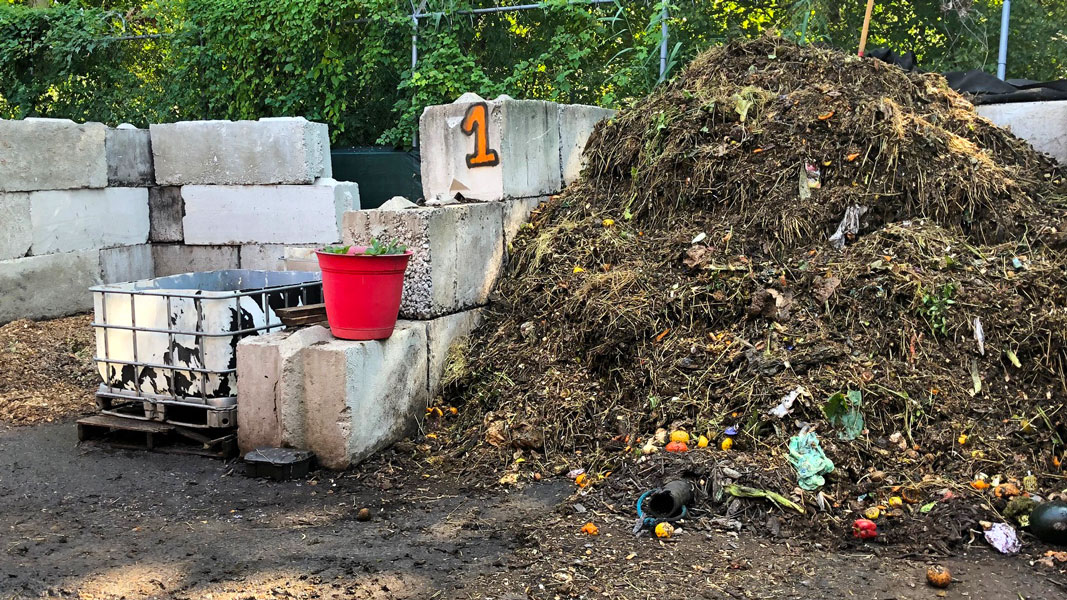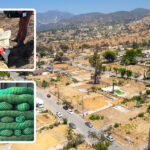Top: Grant funding will assist Bennett Compost (Philadelphia, PA) in making site updates necessary to begin accepting certified food-contact compostable packaging. Photo by Nora Goldstein
The Composting Consortium, managed by Closed Loop Partners’ Center for the Circular Economy, announced in late September the selection of eight municipal and composter-led projects that will receive grant funding to enhance composting infrastructure and the recovery of food-contact compostable packaging. This grant program — in collaboration with the Biodegradable Products Institute (BPI) and receiving technical support from the US Composting Council (USCC) — is “designed to fuel systemic change and increase the acceptance of certified compostable packaging across the U.S.,” according to the Consortium.
The selected projects range from municipal collection pilots to major infrastructure upgrades at composting sites. The total investment aims to address critical bottlenecks in the value chain, from improving the clarity of consumer education to securing the necessary heavy equipment for processing. “This grant program is more than just funding,” explains Rhodes Yepsen, BPI’s Executive Director. “It’s about building a foundation for a circular bioeconomy that works in practice and eventually at scale. Each project helps fulfill the value proposition of compostable packaging, transforming food scraps and food-contact compostables from everyday waste into a valuable soil amendment, creating good green jobs, and fostering resilient, thriving communities.”
The diverse set of projects aims to tackle key challenges in the organics circularity space. Expanding access is a major focus, which the following grants aim to address:
- Washtenaw County, MI: Piloting two to three drop-off sites to serve households without access to curbside food waste collection, with the potential to divert up to 45,000 pounds of food waste and compostable packaging.
- City of Takoma Park, MD: Installing organics collection infrastructure in low-income multifamily housing, paired with outreach and data collection to inform citywide expansion.
- Rubber City Reuse (Northeast Ohio): Launching 15 organics drop-off sites across four counties, serving up to 1.2 million residents.
Crucially, a large portion of the funding is directed at increasing the ability of composting facilities to accept and process certified compostable packaging. Grantees in this category are:
- Compost Colorado (Denver, CO): Double processing capacity at the only Front Range compost producer in Colorado that accepts compostable packaging.
- Veteran Compost (Alexandria, VA): Install new infrastructure to double processing capacity to 2 million pounds annually.
- Bennett Compost (Philadelphia, PA): Update site to begin accepting certified food-contact compostable packaging for the first time at its facility, serving as a model for other smaller-scale facilities in the region.
- Skagit Soils (Mount Vernon, WA): Add new equipment to prepare for increased volumes of food waste and compostable packaging in response to upcoming state legislation.
The USCC recognizes the transformative potential of this targeted funding. “The innovation and ingenuity we saw in the applications and selected projects make one thing clear: the composting industry is ready to grow — and targeted funding can unlock transformative change,” says Linda Norris-Waldt, USCC’s Executive Director. Another project, in the City of Modesto, CA, emphasizes the necessity of clear, consistent public education, updating outreach materials to highlight certified compostable packaging as a key part of a successful program, reducing contamination, and maximizing diversion.
The deployment of these grants marks a vital first step in realizing the full potential of circular organics systems. “By focusing on both infrastructure upgrades and equitable community access, this program is directly addressing the core barriers preventing food scraps and compostable packaging from returning to the soil as valuable resources,” says Paula Luu, Senior Project Director at the Center for the Circular Economy. “This collaborative effort sets a powerful precedent, demonstrating how partnerships between private industry and municipal governments are essential for fostering a resilient, regenerative bioeconomy across the country.”














